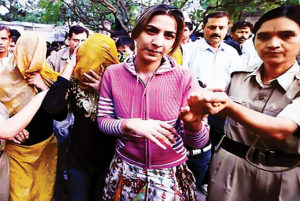The secrecy offered by WhatsApp is being misused to run sex rackets – and the Cyber Cell of the police is helpless unless girls who are being trafficked cooperate with the investigation
“Follow me for WhatsApp fun, and pay to get full pleasure”. It’s entirely possible that you’ve come across such suspiciously cryptic messages on your Instagram posts or in your direct messages.
Patriot decided to track down one such Instagram account named ‘anitapaytm’. Her bio reads, “If u add money in my PayTM wallet, then we do imo, whatsapp fun, those who trusted me can DM..”. Doesn’t sound reliable, does it? Well as it happens, it’s a thriving phenomenon.

We messaged her posing as an interested customer. She replied with a chart, a rate list of the services that can be availed. For instance, “Sex chat for 100 rs, phone sex for 200 rs, video chat for 300 rs, real sex for 1000 rs/hr”.
We said that we wanted to avail the video chat service for Rs 300, and she messaged back with her WhatsApp number, asking us to contact her there. But not before letting us know that we would have to make the transfer to a PayTM account first.
We tried to insist on paying her only after we were sure of getting the service. Which then led to her sending provocative messages like “Please send it fast. I’m horny”. She even said that there were other ‘customers’ waiting for her and so she wanted us to send the money as quickly as possible.

Paying Rs 300 to the Paytm account, we sent a screenshot as a confirmation like she had asked. Immediately after that, she blocked us on WhatsApp and even on Instagram and her account was completely untraceable anywhere on the Internet. ‘Anita’ could have even been a man, for all we know.
The fact is, ‘anitapaytm’ is not the only such social media account that is duping people under the guise of providing sex, or actually soliciting sex work online. There are several of these questionable accounts sprinkled through almost all social media websites, most prominently Facebook and WhatsApp; they are quite easily accessible, just a click away.
There are actually keywords that one can use, to bring up a list of such accounts and contacts on your list of social media contacts. Search words like “call girls in Delhi” and “sex for free” and the like. There are even specific Facebook pages for call girls specific to certain areas in Delhi. Typing in something as basic as “PayTM”, “GPay” or “PayTMfun” will also yield astonishing results on the internet. Or something as specific as “Online sex workers in Delhi.” It’s as simple as that.

Yet, despite their easily detectable presence, the authorities have failed to crack down on this illegal activity. Even though they are quite clearly aware of these growing notorious developments on social media, as pointed out by a source in Delhi Police who did not wish to be named, the police seldom make a breakthrough in such cases. This is perhaps due to guidelines that they cannot proceed with the case without a complaint from the victim. He further adds that these rackets are run by well-planned and well-networked units who mostly manage to evade the authorities quite easily.

Siddhartha Jain, current ACP Gandhi Nagar, who formerly served as ACP of the Cyber Cell, walks us through the first few steps that the cell would usually take, to nab a suspect such as this. He tells us that the police get a slew of complaints every day, complaints of such forward messages and illegal offers. “A lot of the time, these complaints are anonymous, as the people calling in are the very girls who are involved in the business.”
It seems the girls are trapped in the business but are afraid to disclose their identities. “Once we receive the complaint, the first thing we do is inform that particular website to take down the account, or the service provider to deactivate the number. It could be an account on Instagram or a service provider like Airtel.”
Jain explains that, most often, WhatsApp is used because the information is encrypted end-to-end. Facebook is one platform that takes preventive action by blocking and spamming certain messages. WhatsApp does not have that advantage.
“Even on Facebook, they provide their WhatsApp numbers. Most of the solicitation online takes place through WhatsApp, and most of the transactions take place through PayTM,” he informs. This would be followed by intimation of a room number at a hotel; the payment would be made, and then the transaction completed.
One of the most chilling cases solved by Delhi Police was the sex workers’ racket being run through WhatsApp. A young girl named Preeti* was roped into sex work via WhatsApp. Preeti was appearing for her Class 10 board exams, when she got a call from a man claiming his name was Sabir. She had hung up the first time, but Sabir was relentless. He called endlessly for days before Preeti responded.

The two became close and talked often. Preeti did not realise that she was being entrapped in the guise of romance. When Sabir proposed marriage to her, she travelled all the way from her home in West Bengal to New Delhi, only to be dragged to a house in Loni, Ghaziabad, where she was introduced to Sabir’s ‘sister and her two sons.’ Here, she was beaten and raped and denied food repeatedly. Preeti was forced to learn Hindi and was given tablets to swallow daily.
A month later, she was taken to GB Road, an area in Delhi notorious for being a hub for sex workers, and put to work there. To make matters worse, the food they gave her would depend on the feedback they received about her work.
She was tortured and forced to do sex work for three months before she was able to get in touch with her folks back home. As reported, over 20-25 men were forced on Preeti over two shifts every day.
Similar instances of entrapment and forced sex work took place in Jharkhand and Bihar, where girls were trafficked to Delhi, and were roped in through WhatsApp conversations.
In a notable 2016 case, a Russian woman was found in the bedroom of techie Pritendra Nath Sanyal during an income tax raid in his Safdarjung Enclave house. The police were able to identify the pimp, who happened to be a retired colonel of the Indian Army, through a conversation the techie had had with him on WhatsApp. From the rates of these Russian women, to where and when they will meet, the whole thing was communicated over WhatsApp.

Most of the men who lure girls into the business are not real stakeholders. They are simply middlemen responsible for making the connection and bringing in the girls, or dealing directly with clients. There are several such links in the operations. This is why the kingpins are difficult to track. Even if their location can be tracked through their IP addresses, their phones are all registered with fake IDs, so their identity cannot be determined.
The notorious case of Sonu Punjaban comes to mind. She is quite possibly one of the most horrifying gangsters there is.
Her name is really Geeta Arora: she took her first husband’s name Sonu after he died. She’s the kingpin of the flesh trade in the Delhi-NCR area, and her operations extend to Punjab, Mumbai, Kolkata and Rajasthan as well. She’s been married a few times, and all the men she got involved with have ended up dead, gunned down by the authorities mostly. These were all middlemen who were travelling to different parts of the country on her behalf, picking up girls, dropping them off. Payments would be done by cash or PayTM transactions. Punjaban has a thriving operation, and getting thrown in jail does not seem to deter her one bit.
Sonu Punjaban has been arrested on and off since 2007, the last time being in 2017. She is currently out on parole. It makes sense to ask if her physical presence would be required at all in the running of what seems like a well-oiled machine. The middlemen that Jain spoke to during the investigation all pointed towards other middlemen. None of them had any knowledge of how to reach the person at the top of the pyramid.

Beyond a certain point, it becomes difficult to distinguish if girls are being trafficked or soliciting sex work consensually. One of the victims who came to the attention of the police needed medical attention and a good amount of time before she was able to divulge any information about her work. “This one girl had been trapped in sex work for four years. And it happens to many girls, that since they don’t have access to legal facilities or the police, they become dependent on the people torturing them,” says Jain, who was the Investigating Officer at the time.
He tells Patriot that the Cyber Cell receives at least 20-30 such complaints every month, and the whole racket is very scattered. The police have not yet been able to identify any specific areas out of which these operation are being run. But many of these complaints cannot be converted into criminal cases due to lack of cooperation from the complainants. Once their bosses find out that someone has filed a complaint, they begin to harass the victim’s family or offer them money. In most cases, the girls prefer the financial handout over the uncertainty of justice.
“Most of the families of these girls do not know that they are involved in such businesses. So when things get a little more serious, they withdraw their complaints,” he says sadly. It seems that a crackdown on the underbelly of online sex work falls through many cracks.





